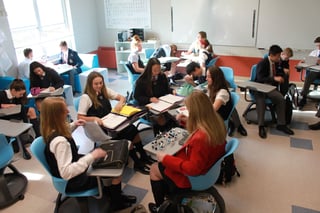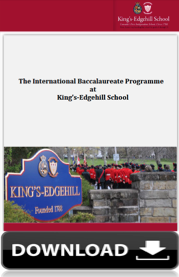Transitioning from high school to university can be challenging. The International Baccalaureate (IB) Programme  offered by King’s-Edgehill School (KES) gives students a competitive edge when it is their turn to attend university. The programme was first developed in Geneva, Switzerland for the families of diplomats and ex-patriates who wanted a way to prepare their children for a globalized economy by offering the type of curriculum that would offer them the skills they needed for university, even as they were junior or seniors in high school.
offered by King’s-Edgehill School (KES) gives students a competitive edge when it is their turn to attend university. The programme was first developed in Geneva, Switzerland for the families of diplomats and ex-patriates who wanted a way to prepare their children for a globalized economy by offering the type of curriculum that would offer them the skills they needed for university, even as they were junior or seniors in high school.
Completing the IB diploma programme requires studying six core courses, a 4000 word extended essay and an independent research study over the final two years of high school. Students also participate in activities that promote values of action, creativity and service. Students participating in the full IB diploma programme at KES will take two language courses, one history, a minimum of one experimental science, one mathematics and one elective course. This challenging and exciting course promotes a strong work and study ethic – valuable skills for any high school student.
IB Framework
Due to the programme’s origins, there is a set structure all schools must follow to meet IB curriculum standards. Many schools around the country offer an IB programme, but each school is unique in its offerings, even though the basic structure is the same. Electives can vary, so it pays to search for a school that matches your child's interests.
Getting Accepted Into an IB Programme
Since the programme offers many benefits, it can be a highly competitive process to get accepted. Each school has its own standards for the application process. At King’s-Edgehill School we encourage students to stretch themselves academically and support new and returning students who want to participate in the full IB diploma programme and those who want to study individual IB certificate courses. Diploma programmes involve a full course of study; the certificate programme involves only those courses within the IB programme that are of interest to your child.
At King’s-Edgehill School, students begin preparing for the IB Progamme in Grade 10 by studying at an honours level. Students have an optimum amount of IB preparation time with time to participate in co-curricular programming - ensuring a well-rounded record of achievement for university placement. Students should consult with school representatives before finalizing their plans for the Diploma Programme.
How the IB Programme Prepares Students to Succeed
The IB programme helps students develop the higher-level critical thinking skills they need to succeed in university. Students become familiar with research skills and excel at reading comprehension. They will have already prepared presentations that communicate to a global audience.
The IB programme can be very demanding, so students that pursue this course of study figure out how to manage their time effectively even before they start university. This can be a big advantage over students who haven’t honed the self-discipline they need to succeed, or the practice of juggling activities so that they don’t feel overwhelmed the first year in university.
Student-teacher engagement is high in the IB programme; it attracts highly motivated students and teachers who love to teach and are good at it. This creates a thirst for knowledge that continues as the students enter university. IB students are enthusiastic about the learning process and thus more apt to stick with it, regardless of the hurdles they encounter later.
Overall, the IB experience fortifies students with self-confidence, self-discipline and critical thinking skills. These students learn how to perform under pressure. They are able to manage the stresses and demands of a more independent learning structure.
Learn more about the IB Programme at our school by downloading, the King’s-Edgehill IB Programme Guidebook.
